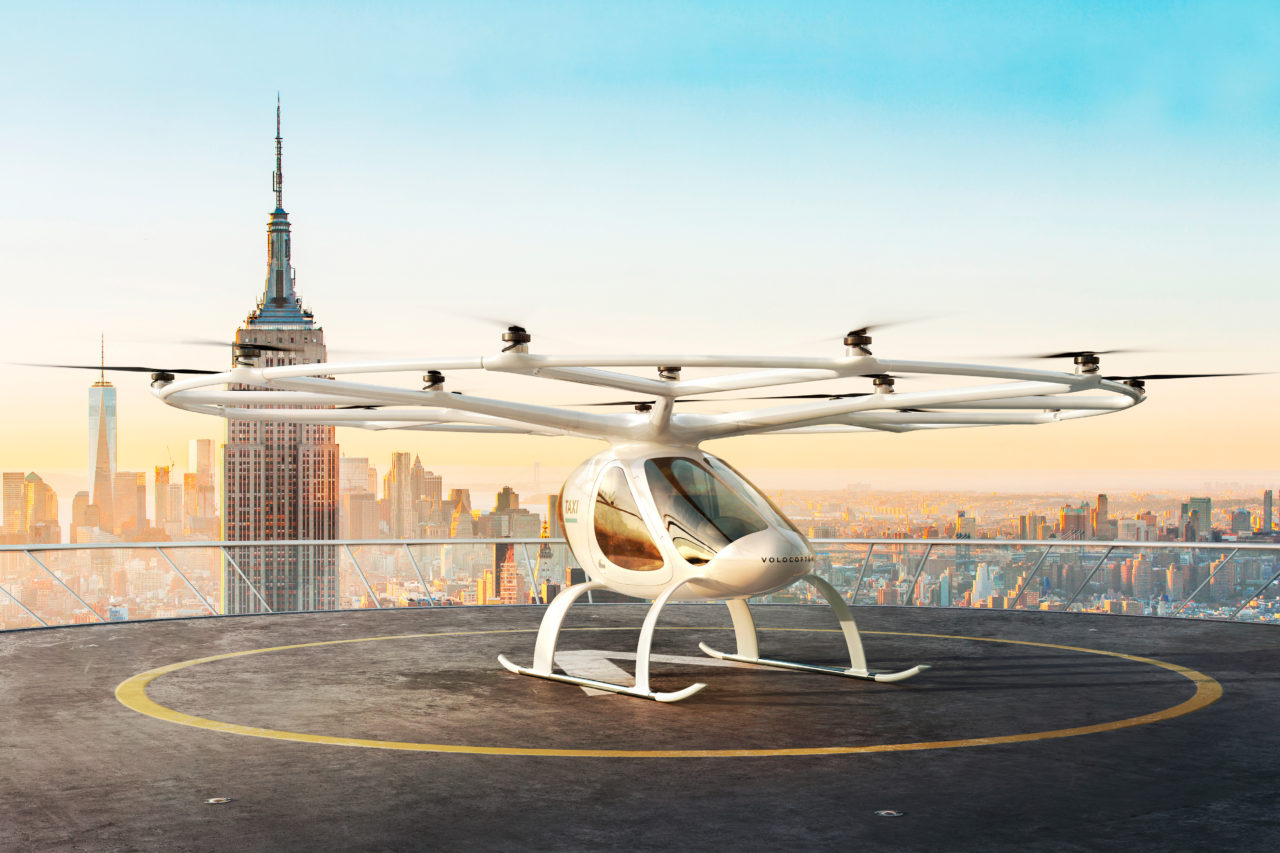
Computer-generated image of a Volocopter air taxi in New York. Photo: Volocopter
Air taxi maker Volocopter closed a $55 million Series C fundraising round, placing the company’s valuation roughly between $220 and $275 million as it looks to launch commercial urban air mobility (UAM) operations in two to three years.
One of the furthest-along air taxi manufacturers in the UAM industry, Volocopter has built and tested three generations of UAM aircraft and recently unveiled its latest design, VoloCity, which it plans to certify and bring to market with this influx of capital. Volocopter recently tested one of its aircraft in an integrated air traffic environment at Helsinki International airport and is working with civil aviation regulatory officials in Singapore to roll out the first VoloCity public test flight there later this year.
“At the very beginning, we are talking about point-to-point connections and each connection being served by a few Volocopters … once there are more than three or four VoloPorts, the Volocopters can connect all these points flexibly,” a representative for Volocopter told Avionics International, describing initial-scale operations.
Volocopter expects its VoloCity design to be ready for mass production in five to ten years, at which point the company hopes to be “flying tens of thousands of passengers every day in a city with Urban Air Mobility Infrastructure,” the spokesperson said.
“It’s a smart step to enter the Chinese market where the opportunities for UAM are opening the fastest and the prospects are great,” said Luuk van Dijk, CEO of Swiss startup Daedalean.ai, which is developing autopilot software for air taxis and has partnered with Volocopter. “This confirms our assumptions about both the market and technology, and makes us even more resolved to be ready with autonomy systems in time for the big scale-up of the flying taxi industry.”
This investment round, led by Chinese automaker Zhejiang Geely Holding Group — which owns Volvo and a stake in Daimler, another participant in the Series C round — also marks the launch of a joint venture between Geely and Volocopter in China, where it will compete with native EHang, set to launch commercial UAM operations in Guangzhou in 2020. Volocopter is targeting Singapore, Dubai and an unspecified European city as its other launch markets.
Volocopter also plans to secure another round of funding later this year, which will likely bring its total capital raise, currently at $89 million according to Crunchbase, above $100 million — a figure that demonstrates the cost of developing, certifying and bringing to market a new aircraft type.
“I think it’s consistent with a long line of ‘hail marys,’ although at least [Volocopter] is farther along in testing than most,” commented Michael Blades, vice president at Frost & Sullivan, on the investment.
 | Want more drone delivery and air taxi news? Sign up for our brand new e-letter, “The Skyport,” where every other week you’ll find the most important analysis and insider scoops from the urban air mobility world. |
For many traditional automakers like Geely and Daimler, however, Volocopter and other UAM startups represent an opportunity to secure a piece of the next-generation transportation pie.
“Geely is transitioning from being an automotive manufacturer to a mobility technology group, investing in and developing a wide range of next-generation technologies,” said Geely’s chairman, Li Shufu, in a statement. “Our joint venture with Volocopter underlines our confidence in Volocopter air taxis as the next ambitious step in our wider expansion in both electrification and new mobility services.”
In the past two years, Geely purchased its stake in Daimler as well as equity in Chinese ridesharing company Caocao Chuxing, according to Crunchbase.